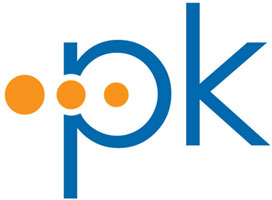Pharmaco-Kinesis Corporation Awarded Department of Defense Grant to Develop Biosensor for Early Detection of Acute Organ Injury
LOS ANGELES, CALIFORNIA, May 31, 2014 – Pharmaco-Kinesis Corporation (PKC), a medical device company that is deve
 loping smart implantable pumps for controlled drug delivery and biosensor technology, announced today that it has been awarded a grant by the U.S. Department of Defense (DoD) for development of “Carbon Nanotube Based Biosensor for Organ Injury Detection”. PKC’s Nano-Impedance Biosensor (NIB) technology was competitively selected for the Phase I grant award, totaling $150,000, under the Small Business Innovation Research (SBIR) program of the DoD Defense Health Program (DHP).
loping smart implantable pumps for controlled drug delivery and biosensor technology, announced today that it has been awarded a grant by the U.S. Department of Defense (DoD) for development of “Carbon Nanotube Based Biosensor for Organ Injury Detection”. PKC’s Nano-Impedance Biosensor (NIB) technology was competitively selected for the Phase I grant award, totaling $150,000, under the Small Business Innovation Research (SBIR) program of the DoD Defense Health Program (DHP).
 This highly competitive and prestigious award will support the expansion of PKC’s nano-biosensor technology. Originally designed as an integral part of PKC’s core Smart Drug Delivery SystemTM(SDDS) technology platform for use in the Metronomic Biofeedback Pump (MBP) for the detection of cancer biomarkers in the brain, the NIB is now being applied through a point-of-care diagnostic device for early detection of organ injury. Detection by the device is enabled through measurement of kidney and liver injury biomarkers, such as albumin and glutathione-S-transferase, in urine and blood. Since organ failure outcome has been shown to correlate closely with timely diagnosis, this technology can be vital for individuals at risk for kidney and liver injury. Patients suffering from diabetes, and cancer patients undergoing chemotherapy treatments, for example, can benefit from timely diagnosis of organ failure that the device can detect. The SBIR grant, which is subject to the availability of U.S. Government funds, was made to PKC after a thorough review process by the DoD.
This highly competitive and prestigious award will support the expansion of PKC’s nano-biosensor technology. Originally designed as an integral part of PKC’s core Smart Drug Delivery SystemTM(SDDS) technology platform for use in the Metronomic Biofeedback Pump (MBP) for the detection of cancer biomarkers in the brain, the NIB is now being applied through a point-of-care diagnostic device for early detection of organ injury. Detection by the device is enabled through measurement of kidney and liver injury biomarkers, such as albumin and glutathione-S-transferase, in urine and blood. Since organ failure outcome has been shown to correlate closely with timely diagnosis, this technology can be vital for individuals at risk for kidney and liver injury. Patients suffering from diabetes, and cancer patients undergoing chemotherapy treatments, for example, can benefit from timely diagnosis of organ failure that the device can detect. The SBIR grant, which is subject to the availability of U.S. Government funds, was made to PKC after a thorough review process by the DoD.
“Pharmaco-Kinesis Corporation has demonstrated proof-of-concept of the nano-biosensor technology in detecting cancer biomarkers, and we now look to expand this technology into the portable point-of-care diagnostic market with capability for data to link to cloud,” said Frank Adell, CEO of PKC. “Our NIB technology platform is expected to bring a fundamental transformation in the way disease is detected in the body. PKC’s NIB will allow patients and physicians to detect acute organ failure at a very early stage. This means the patient could have greater lead times for treatment, resulting in improved and potentially lifesaving outcomes. Eventually, we envision an at-home diagnostic tool that can be used be used to screen blood and/or urine samples against a panel of biomarkers. This device could detect acute organ injury for multiple organ systems in the body simultaneously. We believe that PKC’s innovation in biosensors can have far reaching implications for detection and treatment of disease while reducing the cost of health care. We’re very pleased that the DHP and DoD have elected to support this potentially breakthrough nanotechnology under development at PKC.”
Mr. Adell noted that upon successful completion of the Phase I work, PKC will be eligible to submit for a Phase II grant of up to $1 million.
“PKC is committed to making the high quality US standard of care affordable to Americans from all walks of life, and indeed to people throughout the world. Innovation in technology can help make our healthcare system affordable through early detection of disease, potentially keeping people away from the inpatient hospital setting. PKC is among the companies that are pioneering this concept through our innovative and inexpensive point-of-care diagnostic devices for home use. We expect the Nano-Based Biosensor Technology Platform of PKC to open new doors for patients in detection and treatment acute failure of multiple organ systems in the body. We believe by providing an early warning of acute organ injury, this device will ultimately decrease morbidity and increase the quality of life of patients at risk for organ failure, while saving our healthcare system a significant amount of resources,” Mr. Adell concluded.
